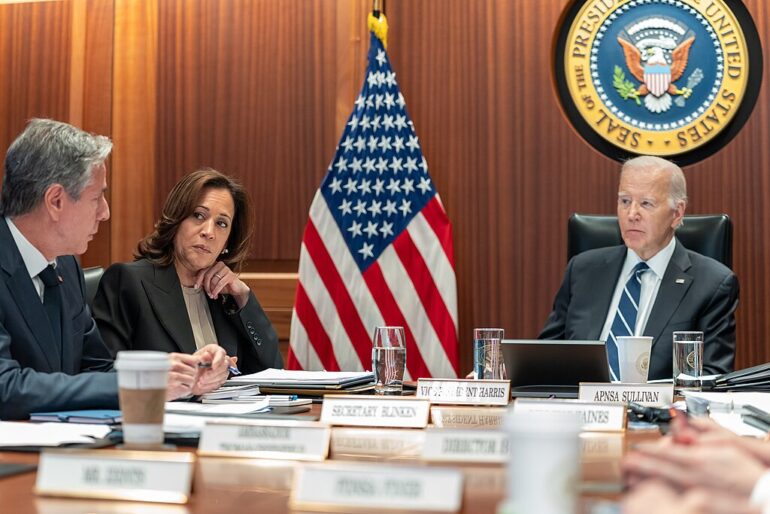US Secretary of State Anthony Blinken announced yesterday that Washington strongly opposes an Israeli “reoccupation of Gaza after the conflict ends.”
Blinken proposed instead “Palestinian governance, Gaza unified with the West Bank under the Palestinian Authority… and a pathway” while conceding “there may be need for some transition period.”
The US has also floated creating an international administration of regional powers, namely Jordan, Egypt, Qatar, and Turkey, to govern the territory under US supervision. But each of these states have rejected the proposal and aren’t interested in being involved in Gaza’s governance.
Blinken’s remarks came a day after an historic announcement by Prime Minister Binyamin Netanyahu (Likud) that “Israel, for an indefinite period, will have overall security responsibility [over Gaza],” insinuating that his government may see no alternative to Israel controlling Gaza.
This was soon echoed by many in the Israeli government, including opposition lawmaker Avigdor Lierbman (Yisrael Beiteinu) who stated, “Returning the Palestinian Authority to Gaza is delusional” and an unnamed senior government official who plainly stated that “the Palestinian Authority wants to destroy the Jewish state.”
In fact, the mood in much of Israeli society has been one of jubilation as we’ve watched our army take control of Gaza since the ground offensive. Jubilation mixed with sorrow as we’ve buried our fallen soldiers.
The desire for Gaza feels palpable throughout the nation and this could complicate American efforts to force us out again. As we watched our soldiers raise our flag on Gaza’s shores today, we felt a real sense of coming home after18 years of separation.
From a security perspective, it’s clear that the only way to keep our people safe – especially in the country’s south, is for Israel to maintain control of Gaza. Knowing that Washington is vehemently opposed to such an outcome, our security experts vainly try to find a realistic alternative.
US National Security Council Spokesman John Kirby slightly moderated the American position by clarifying that “I think all of us can foresee a period of time after the conflict is over where Israeli forces will likely still be in Gaza and will have some initial security responsibilities, but for how long and where and to what size and scale and scope, I think it’s too soon to know. I think where we are is a lot of questions, and not a lot of answers. We know what we don’t want to see in Gaza post-conflict, we don’t want to see Hamas in control and we don’t want to see a reoccupation by Israel.”
The Biden Administration’s stated policy to force Israel to relinquish its responsibility over Gaza does not exist in a vacuum. The policy of dividing the land which had once been the British Mandate for Palestine into multiple states has been an official and consistent US policy for at least as far back as the 1946 Morrison-Grady Plan.
Since then, Washington has regularly attempted to divorce us from our land, leveraging tools like economic and diplomatic pressure, as well as promises of material and political support.
So far in this war, Israel’s leadership has shown a heroic resilience in the face of American pressure. Lazar Berman writes that: “After October 7, experts warned that the impending ground invasion would be ‘very, very messy.’ The US sent military experts to Israel to reportedly convince its leaders that urban combat would be too bloody, and that a more prudent path would be an operation consisting of airstrikes and special forces raids.
Israel instead went a different route, dispatching tanks, infantry, and combat engineers in deliberate maneuvers across the territory’s dunes and fields along the border before reaching Gaza City’s suburbs. Thousands of reservists joined much of the military’s active ground force inside the Strip.”
There are two reasons for Washington’s long standing commitment to divide our land worth considering.
First, there is the strategic rationale of splitting what could be an independent regional power into multiple, weak, warring, small dependent states.
Second, there is the philosophical rationale of preventing the transformation of what the Western world regarded as the historically irrelevant Jewish people into a resurgent Israel that would undercut the constructed ethos that Western civilization has superseded us as history’s central actor.
Israel has already withstood US pressure against a ground invasion. Going forward, Jerusalem will need to withstand the American goal of setting up a puppet dictatorship in Gaza and the West Bank under the Fatah-led Palestinian Authority, deeply unpopular with Israelis and Palestinians (PA President Mahmoud Abbas was nearly assassinated by Palestinians just this week).
Israel’s leadership must maintain the strength it has so far displayed in the face of the US pressure. For that, our public must make itself aware of the hostile nature of American influence in the region, such that we can encourage our leaders to prioritize our security and national aspirations over US imperial interests.





